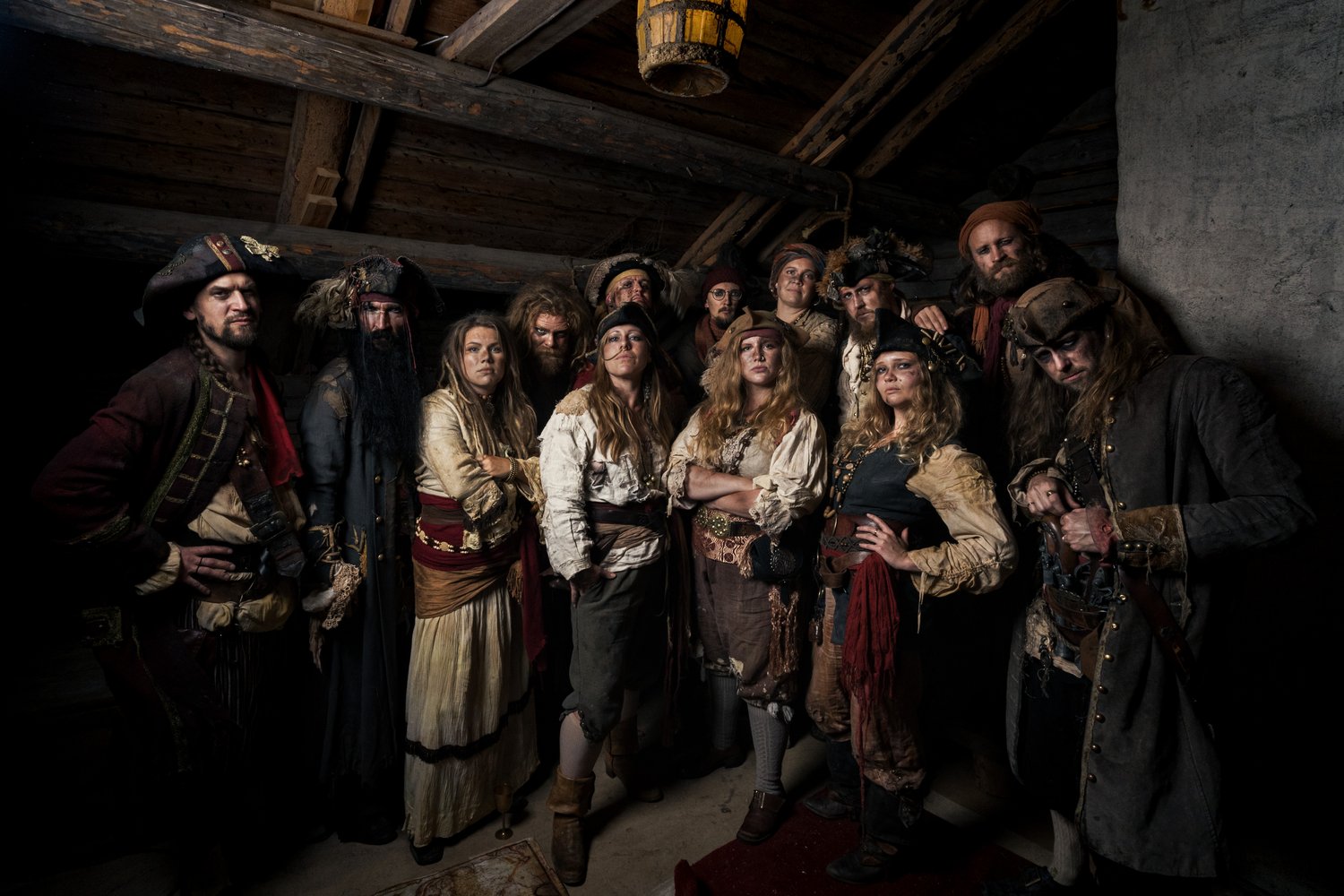Until recently, I’d never heard of Ye Banished Privateers. One spin of their latest album changed that completely. What I expected to be a cheeky pirate romp turned out to be an emotional, multi-layered journey that hit far harder than anticipated. The album caught me off guard. The more I listened, the more it revealed itself: clever, layered, and deeply emotional. Not just a collection of songs, but something that felt like it had a through-line.
Naturally, I had questions. So, I sat down with two of the band’s many members – Magda “Magpie” Andersson and Lovisa “Quick Fhinn” Fhinn – to talk about melancholy sea songs, theatrical performances, and the tragic humour of life at sea.
Folk Roots and Pirate Melancholy
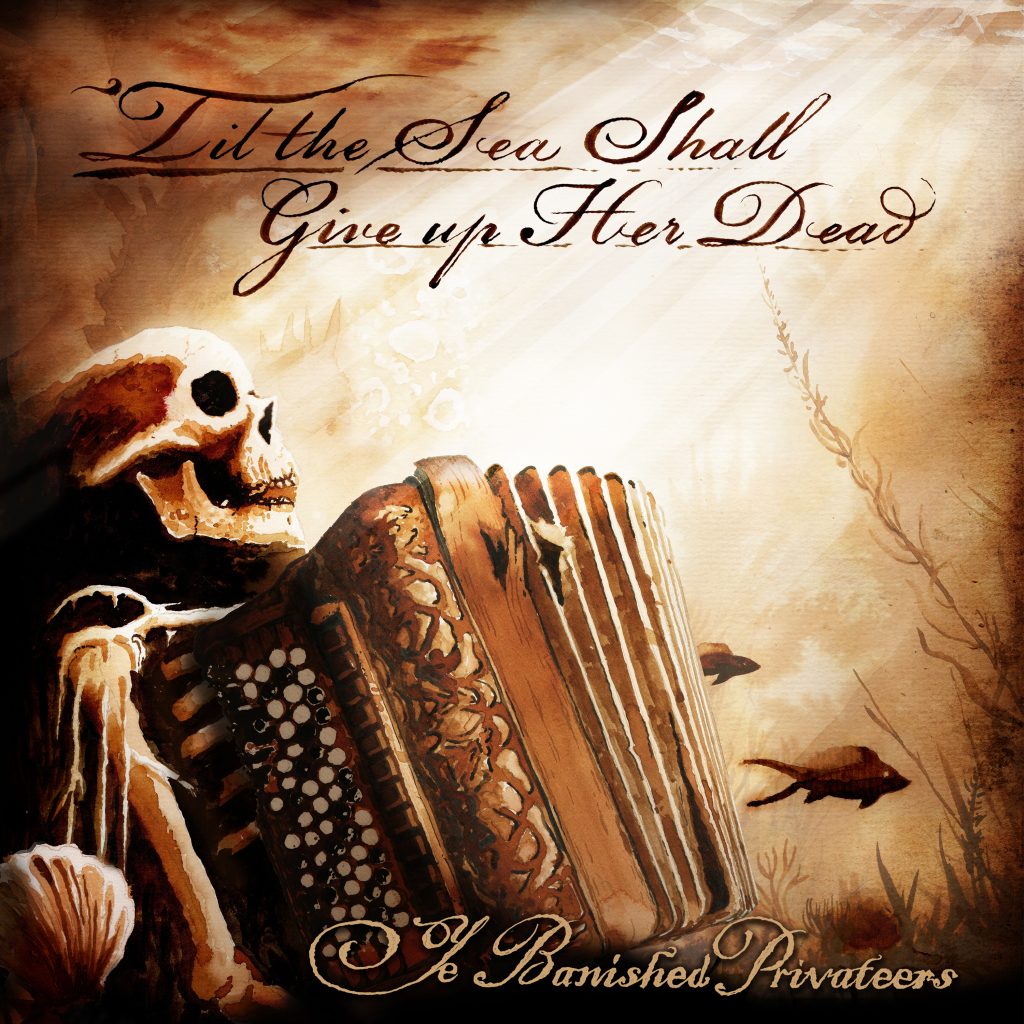
Daniel: How are the nerves? Are you excited for the release? Or does this ever get old?
Quick Fhinn: No!
Magpie: Definitely never gets old. Actually, I get more anxious with every release. We want people to enjoy the work, of course – and we’re very proud of what we’ve created – but I do still feel nervous and excited every time.
Daniel: Did you have a narrative in mind for the album? It felt like a genuine journey.
Magpie: Like a full-on narrative? Yes, a little bit, although I’d say we went for a more narrative-heavy approach on our last album, Hostis Humani Generis. This one is more about a central idea: the ocean – what it gives, what it takes, and the hardships of living as a sailor in the 18th century.
Daniel: There’s one track I couldn’t get out of my head – Waves Away. A hauntingly beautiful piece, and yet quietly devastating. How did that one come to be?
Magpie: That song is like a spin-off or continuation of Fisher Lass, the final track of our second album The Legend of Libertalia. It’s about a woman waiting on the shore for her lover to come home – but he never does. His ship is wrecked against the cliffs, and he never returns. The song was inspired by a poem, but we felt we weren’t done telling that story. Waves Away is like Fisher Lass: Part 2. We wanted to tell the same story but from the side of the one who never returned.
One of the most striking things about Ye Banished Privateers is how naturally their music blends cultural tradition with performance. It’s not just a band playing songs – it’s a crew breathing life into an entire world. When we spoke about their influences, Lovisa (“Quick Fhinn”) mentioned her deep roots in Swedish and Scandinavian folk – mournful tones, weeping violins, and what Magda translated as a kind of “northern melancholy”. That feeling bleeds through even their rowdiest tracks, giving them unexpected emotional weight.
A Crew of Many Sounds
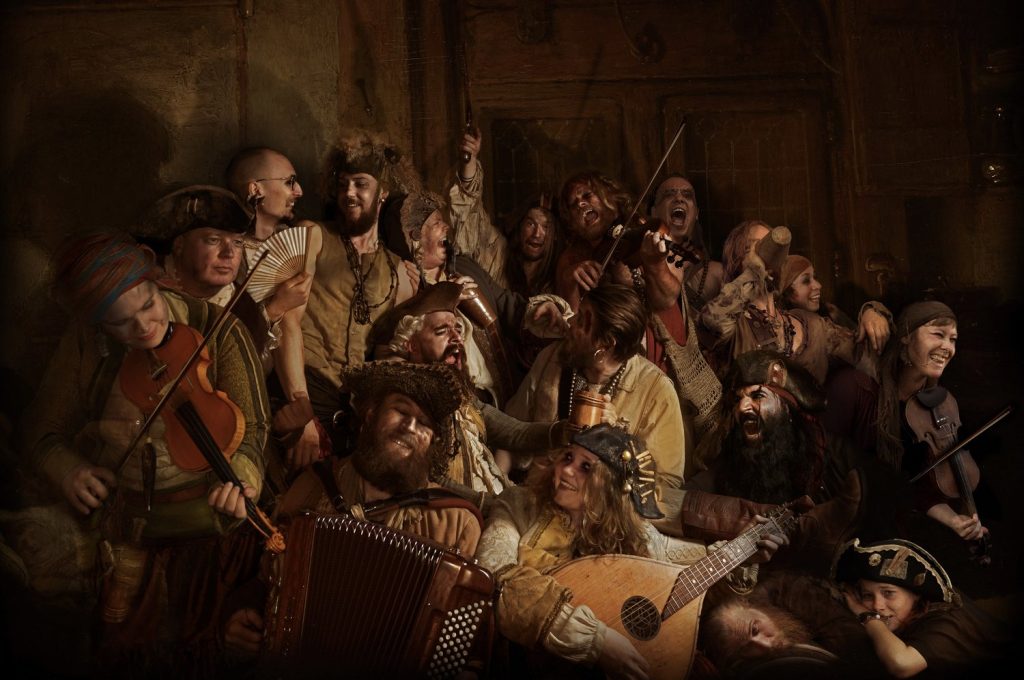
But their sound isn’t limited to the North. Irish folk has found its way in too – a reference to Tír na nÓg stood out in the lyrics – and Lovisa explained how the band broadened her perspective. As a pirate band, it makes sense: your sound picks up whatever your ship encounters. Irish melodies, foreign rhythms, sorrow, rage, joy – it’s all part of the voyage.
What really fascinated me was how eclectic the full band is. Some members have folk backgrounds, and others come from metal or entirely different genres. That mix should be chaos, but somehow, it becomes something cohesive. A pirate-folk-theatre hybrid that absolutely shouldn’t work – but it does.
That theatricality isn’t just in the music. Their live shows are full of character work, improvisation, and storytelling. Some former members were trained actors, and their influence still lingers. The result? Performances that feel more like living theatre than traditional gigs. They don’t just play pirates – they are pirates. No one’s written a play yet, but it wouldn’t take much. The songs already tell the story. All it needs is someone to step into the spotlight and string it all together.
Daniel: One of the more poetic tracks, As the Tree Falls, felt like a captain’s final message to a lover – or to God. Do you always go that deep with your writing process?
Magpie: We take a lot of pride in telling good stories, and in the way we write them. We aim to paint a proper picture of how life was during those days, and we want to show them from different perspectives. We believe it’s important to tell these stories from everyone’s point of view. They need to capture the lives not only of the famous kings, warriors and pirates but also of the regular, common people who lived during that period. We’re actually more interested in those stories – the ones lived by regular folk – so we do a lot of research to make sure they’re accurate. So yes, it’s very deliberate, and we’re really proud of our songwriting and storytelling.
Daniel: There’s also a lot of shifting perspectives in the songs – almost like each one is told by a different crew member.
Quick Fhinn: This is the first album I’ve released with the band, but Magda’s been with them for over 11 years now. So, if you think about it, the songs are being sung by a crew – different voices, different stories, all part of the same world. And that means we all put a lot of effort into the meaning behind each song.
Daniel: What about the final track, Sailmaker’s Song? It’s a sombre, almost sacred piece that explores funeral traditions at sea. It felt like a full ritual, complete with prayer.
Magpie: That one’s really special. Bellows wrote the lyrics and did a deep dive into burial traditions at sea. Back then, it was often the sailmaker who stitched the dead into their canvas shrouds so they could be sunk into the ocean. The line I sing in the bridge – “to the deep, turned to moist, till the sea shall give up her dead” – is taken from the Book of Common Prayer. That’s actually where the album title comes from. It made sense to end the album with a funeral. There are so many deaths throughout – drowning, shipwrecks, madness – and we wanted to give them a proper send-off.
Rowdy but Thoughtful
What struck me most about Ye Banished Privateers was how effortlessly they blur the line between comedy, tragedy, and commentary – sometimes all within the same track. Every song, no matter how filthy or absurd, is crafted with care. Magda confirmed it: even Rowing with One Hand (yes, it’s what you think) is given full narrative and musical attention. It’s ridiculous – but never lazy. Ringaroo at Cooper’s Inn and Raise Your Glass show that duality perfectly. The latter begins as a solemn toast, then descends into chaos, like grief tipping into hysteria. This band doesn’t avoid emotional messiness – they dive headfirst into it.
Take Ships Lost at Sea. It felt like it was sung by the ship itself – a vessel cracking under pressure. Lovisa said it’s about mental decline too, that slow unravelling. Magda added it was a metaphor for mental illness, which made perfect sense. The structure breaks down by the end, music spiralling into madness. It’s brilliant storytelling.
Then there’s Here’s to the Royal Navy – sharp, satirical, and brutal. A sailor toasting the very system that’s killing him: “I can’t afford to eat, but anyway – here’s to the Royal Navy!” I laughed. Then I winced. That’s the album’s heart: the pull between despair and defiance. Death at sea was expected. Surviving was a surprise. So, you drank, sang, and laughed through it.
Their songs feel lived in. And I had to ask – how much of it comes from real experience?
Daniel: Do any of your songs come from actual band experiences? Or is it all myth-making?
Quick Fhinn: Let’s just say… some stories are made up; some might have happened. We’ll leave that open to interpretation.
Magpie: Often, when we write about hangovers, we’re pulling from something that actually happened. Especially the song A Night at the Schwarzer Kater – very much based on a real night. If you ever visit Schwarzer Kater, you’ll understand. We have a lot of fun together when we’re on tour, and we draw inspiration from those experiences for our songs as well.
Quick Fhinn: Touring with this band feels like being part of a big pirate family. There are highs and lows, but we’re always learning, and we’ve got each other’s backs. That camaraderie – that’s what Mates Together is about. And Sailmaker’s Song connects too, because life doesn’t stop just because you’re on the road. We support each other, no matter what we’re facing.
Daniel: Going back to the album for a moment – which song was the easiest to write? And was there one that really stood out as the hardest?
Magpie: The hardest one was definitely Whydah Galley. It was a very different kind of song for us – in a good way – but it took a while to come together.
Quick Fhinn: It was like a massive puzzle. We were all so involved in writing it, and there were so many different versions and ideas. Everyone had input – “Let’s do this!”, “No, this!” – and eventually we had to step back and go, “Alright, now we have to actually build this thing.” And then somehow, we kept adding more pieces.
Daniel: Could’ve ended up twenty minutes long!
Quick Fhinn: Easily! But I’m really happy with how it turned out. I’m excited for people to hear it.
Daniel: I liked that one a lot. There’s this strange sense of cognitive dissonance in it – like the narrator is aware of what they’re doing, but they’ve rationalised it as “just a job”. And paired with Chained Below, it creates this heavy, sobering look at reality. Whydah Galley has this weirdly prideful tone, but it’s also confronting something very dark.
Magpie: Yeah, that’s something we haven’t tackled much before. The slave trade is a really dark part of history, and it’s not easy to approach it in a respectful and meaningful way. But we felt it was time to touch on it somehow – even if it’s uncomfortable.
Daniel: I think you handled it impressively. It captured that psychological distance – how people involved in it likely had to shut off emotionally, dehumanise others, and convince themselves it was just cargo. Business. Nothing more.
Magpie: Thank you. That was the aim.
Daniel: And what about the easiest track to write?
Magpie: I’d say Here’s to the Royal Navy came really naturally – it’s very much in our band’s voice. Waves Away was the same, in a different way. Both of those just kind of fell into place.
Chaotic Good Camaraderie
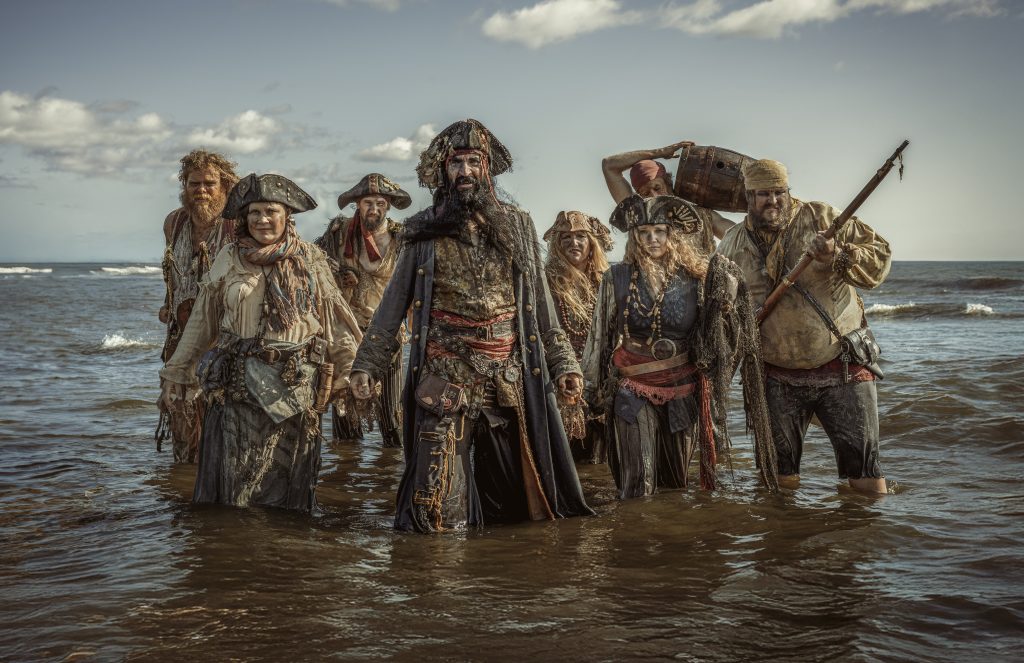
There’s a lyric on the album that stuck with me – “I’m your bully in an alley”, followed immediately by “Please help me”. It nailed that chaotic but loyal dynamic, the kind of rough camaraderie where you can fight, then turn around and rely on each other without question. Talking to Lovisa and Magda, it became clear this isn’t just fiction – it reflects their real-life bond as a band.
Touring, as they described it, is more relentless than romantic. There’s little time for sightseeing. Most of it’s spent crammed into a van, either zoning out or throwing impromptu, beer-fuelled parties. But they wouldn’t trade it. Magda said she can’t wait to get back in that van with everyone. Even when they’re not officially working on a new album, they’re still creating. Their process is deliberate – not a vault of leftovers, but something shaped by the weird magic of life on the road.
And those gigs? Something else entirely. I saw footage of them at the Black Heart in Camden – tiny stage, shoulder to shoulder – and yet they managed a full-blown on-stage brawl mid-song. One of them ended up flat on the floor. Absurd, theatrical, and completely brilliant. Magda just shrugged and said, “You’ve got to prioritise.” I asked how they keep the energy up. Lovisa said it’s an exchange – a passing of energy between bandmates. Magda agreed. They love what they do, and the audience feels that. Honestly? Who wouldn’t want to be part of that chaos?
Tour Vans, Sock Fights, and Pirate Glue
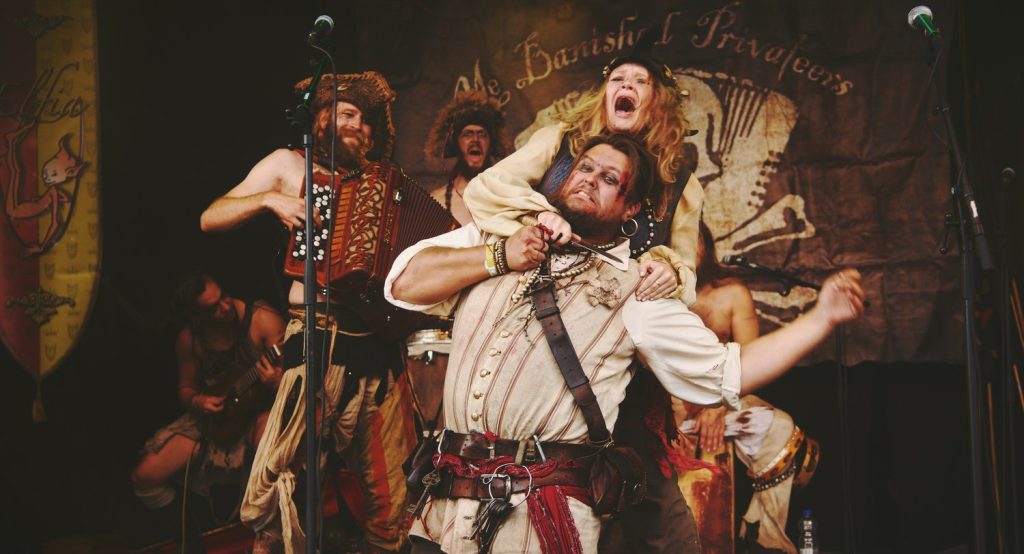
Daniel: Bit of an odd one for you – I’ve worn one of those puffy pirate shirts before, and I was baking in it. I can’t imagine what it’s like doing a full set in that, plus leather and layers.
Magpie: Do you want to know what we smell like?
Daniel: Not quite where I was going… but I suspect the answer is “bad”.
Magpie: There’ve been times when I’ve seen male band members literally squeeze water out of their clothes. It’s disgusting.
Quick Fhinn: And sometimes we barely have time between shows. We just sleep in the make-up, wake up, slap a bit more on, and keep going. At some point you stop trying to clean it – you just build on the masterpiece.
Daniel: Pirate-glam never dies. It evolves.
Magpie: You should see our laundry days. When we finally get a break, we hunt down a washing machine and stand in a circle trying to sort everything out. “This is your shirt. These are your socks. These are your… panties.” Total chaos. We even had a sock fight last year.
Daniel: A sock fight?
Magpie: Oh yeah. Full-blown. No survivors.
Daniel: That’s brilliant. Honestly, I don’t have much else – I just want to say thank you. This was my first-ever interview, I was nervous as hell, but I genuinely love the album. It’s incredible.
Magpie: Thank you. It was a lot of fun!
Quick Fhinn: Yes, thank you!
Daniel: I’ll see you in Islington. I’ll be that guy in the crowd shouting every lyric.
Interviewing Ye Banished Privateers felt less like chatting with musicians and more like getting swept into the crew’s world – sweaty shirts, sock fights and all. Behind the theatre, though, is a band that genuinely loves what they do, and it shows in every note. Their ability to balance tragedy and hilarity, heartbreak and absolute chaos, is nothing short of masterful. And while I may have entered the interview nervously clutching my notes, I left feeling like I’d just staggered out of a tavern with a bunch of old friends. The only thing missing was a tankard of rum.
Interview by Daniel Bunten. Edited by Lúcia Correia.
